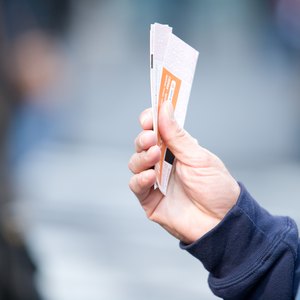
The secondary ticket market in 2012 was about a $3 billion to $5 billion business, growing at a rate somewhere between 12 percent and 24 percent. While more tickets are being resold, the price of those tickets is declining slightly. The state in which you live primarily determines if scalping is illegal or, if it's legal, the types of restrictions imposed on after-sale tickets. In some cases, however, local governments have the authority to legislate ticket reselling.
Prohibited
As of 2013, only a few states prohibited reselling tickets or made it unreasonable to do so. The practice is prohibited in Kentucky and Michigan, although Kentucky doesn't establish any penalties for a violation. Massachusetts limits the markup to $2 but allows a broker to add a service charge to recoup the expense of buying the ticket. Rhode Island and North Carolina both limit the amount charged above face value to $3. New Jersey has a more generous policy that enables brokers to charge up to 150 percent of the ticket's face value.
Minimal Restrictions
Scalping is generally permissible in a number of other states with limited restrictions. For example, Arizona and California restrict the locations where tickets can be resold; Delaware also restricts the time they can be resold. Arkansas, Florida and Louisiana require brokers to comply with regulations that protect consumers, such as a guarantee to issue a refund if the event is cancelled or the ticket doesn't arrive on time. Mississippi and New Mexico prohibit reselling only college events. Hawaii, Indiana and Maryland prohibit reselling boxing, wrestling or kickboxing events. South Carolina permits only online sales.
Licensure, Registration and Delegation
Several states, including Alabama, Georgia, Illinois, Massachusetts, New Jersey, New York, Pennsylvania and South Carolina require that anyone who resells tickets must either register or obtain a license from the state, both of which require an annual fee. Instead of legislating at the state level, Maryland, Ohio, Virginia and Wisconsin delegate the authority to local governments. Baltimore and Cincinnati both prohibit scalping, but Cleveland allows it. Wisconsin prohibits resale of tickets to the state fair.
No Legislation
Alaska, Colorado, Idaho, Iowa, Kansas, Maine, Montana, Nebraska, Nevada, New Hampshire, North Dakota, Oklahoma, South Dakota, Texas, Utah, Washington, West Virginia and Wyoming have no laws or regulations regarding ticket scalping. Oklahoma City and the City of Las Vegas both prohibit the practice. Connecticut, Minnesota and Missouri had laws restricting ticket resales and repealed them. Attempts to reintroduce ticket scalping regulations failed in all three states during 2011. Oregon, Tennessee, Vermont only prohibit the use of software to purchase tickets for the after-market.
References
Writer Bio
Steve McDonnell's experience running businesses and launching companies complements his technical expertise in information, technology and human resources. He earned a degree in computer science from Dartmouth College, served on the WorldatWork editorial board, blogged for the Spotfire Business Intelligence blog and has published books and book chapters for International Human Resource Information Management and Westlaw.

